五年级下册英语第三模块知识点
人教版五年级下册英语第三单元知识点

人教版五年级下册英语第三单元知识点
1.词汇
单词:具备词汇记忆能力,掌握本单元所学的单词,如cat、dog、bird等。
拼写:正确拼写单词,注意字母的发音和顺序。
词义理解:了解单词的意思并能在句子中正确使用。
2.语法
一般现在时:研究一般现在时的用法,如I ___.(我每天吃早饭。
)
疑问句:研究构建疑问句的语法结构,如Do you like bananas?(你喜欢香蕉吗?)
肯定回答和否定回答:研究针对疑问句的肯定回答和否定回答,如Yes。
I do。
/ No。
I don't.(是的,我喜欢。
/ 不,我不喜欢。
)
3.句型
主谓结构:学会用主谓结构来构建简单的句子,如I like to eat pizza.(我喜欢吃比萨。
)
主语+动词+宾语:学会用主语、动词和宾语构成句子,如She has a cat.(她有一只猫。
)
4.日常用语
问候和介绍:学会基本的问候语和自我介绍,如Hello。
/ My name is Lucy.(你好!/ 我的名字是___。
)
表达喜好:学会用英语表达自己的喜好,如I like ice cream.(我喜欢冰淇淋。
)
以上是人教版五年级下册英语第三单元的知识点。
通过掌握这些知识点,可以提高英语的听说读写能力。
请同学们认真学习并加以实践。
五年级下册英语第三单元知识点整理
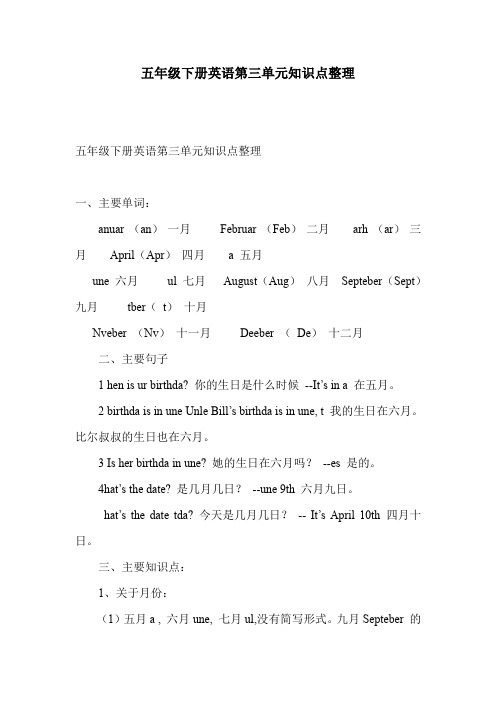
五年级下册英语第三单元知识点整理五年级下册英语第三单元知识点整理一、主要单词:anuar (an)一月Februar (Feb)二月arh (ar)三月April(Apr)四月 a 五月une 六月ul 七月August(Aug)八月Septeber(Sept)九月tber(t)十月Nveber (Nv)十一月Deeber (De)十二月二、主要句子1 hen is ur birthda? 你的生日是什么时候--It’s in a 在五月。
2 birthda is in une Unle Bill’s birthda is in une, t 我的生日在六月。
比尔叔叔的生日也在六月。
3 Is her birthda in une? 她的生日在六月吗?--es 是的。
4hat’s the date? 是几月几日?--une 9th 六月九日。
hat’s the date tda? 今天是几月几日?-- It’s April 10th 四月十日。
三、主要知识点:1、关于月份:(1)五月a , 六月une, 七月ul,没有简写形式。
九月Septeber 的简写形式是前四个字母加点Sept 其他八个月的简写形式是前三个字母加点。
(2)无论是完全形式还是简写形式,表示12个月的单词的第一个字母都要大写。
2、关于基数词变序数词。
(1)一般情况下,直接在基数词后面加th (ne , t , three 除外)。
ne-first , t-send , three-third(2)以ve结尾的基数词,变ve为f, 再加th 如:five-fifth , telve-telfth(3)以t结尾的基数词,直接加h如eight-eighth(4)以不发音的字母e结尾的,丢掉不发音的字母e,再加th 如nine-ninth()以结尾的整十数,在变为序数词时,将变为ie, 再加th 如tent-tentieth(6)20以上的两位数,变为序数词时,十位数不变,只将个位上的数变为序数词。
五年级下英语第三单元知识点汇总

五年级下英语第三单元知识点汇总Unit3WritingHome一、词汇(千里之行,始于单词哦!)二、句型(学会了这些句子,会变得更加优秀哦!)1.ThipotcardhaapictureofthePalaceMueum!这张明信片有一张故宫博物馆的图片。
2.Iwanttoendthipotcardtomymumanddad.我想要把这张明信片发给我的妈妈和爸爸。
3.A:MayIeethatpotcard,pleae请问我可以看那张明信片吗B:Sure!当然!4.A:Howmuchithipotcard这张明信片多少钱B:It'twoyuan.两块钱。
A:I'lltakenine,pleae.我要买九张。
5.WearehavingfuninBeijing.我们正在北京玩。
6.A:E某cueme,whereithepotoffice抱歉,邮局在哪里B:Gotraight.Turnleftatthetrafficlight.直走。
在红绿灯处左转。
7.A:Whatareyoudoing你正在做什么B:I'mwritingninepotcardtomymother.我正在给我的妈妈写九张明信片。
8.Apotcardilow.Anemailifat.明信片慢,邮件快。
9.Let'endanemail.让我们发一个电子邮件吧。
B:Sure.当然。
11.HowitheweatherinCanada加拿大的天气如何12.Thereinonow.这里没有雪。
13.Whatagreattrip!多棒的一次旅行啊!我将在二月八日返程回加拿大。
15.Whatafuntrip!多么愉快的一次旅行啊!16.Tomorrowyou'llgobacktoCanada.We'llmiyou.明天你将返回加拿大。
我们会想念你的。
17.Don'tforgettowritetou.别忘了写信给我们。
人教版五年级英语下册Unit3-知识点整理
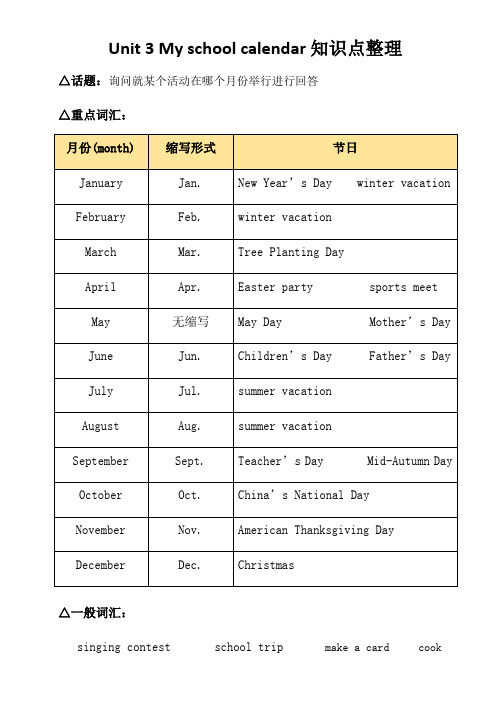
Unit 3 My school calendar 知识点整理△话题:询问就某个活动在哪个月份举行进行回答△重点词汇:△一般词汇:singing contest school trip make a card cook 歌唱比赛学校郊游制作卡片烹饪write a letter tell a story play the pipa写信讲故事弹琵琶eat mooncakes play games say“Thank you”吃月饼玩游戏说“谢谢你”a few the Great Wall look for holiday chocolate一些长城寻找假期巧克力birthday parents will after month bunny 生日父母亲将要在……之后月份兔子△句型:①询问某活动/节日的日期When is Children’s Day?儿童节是在什么时候?——It’s in June. 它在六月。
②表达某人将要做某事(将来时)What will you do in October?在十月你们将做什么?——We will go to the Great Wall. 我们将要去长城。
What will you do for your mother on Mother’s Day?在母亲节你将为你妈妈做什么?——I will cook for my mum. 我将为我妈妈做饭。
【拓展:will+动词原形】③同一个问句反问别人What about you? = How about you?= And you?(你呢?)△知识点:1.2.in+月份 in June (在六月)3.4.on+几月几日/节日on March 23rd / on Mother’s Day5.五月May没有简写形式。
九月September的简写形式是前四个字母加点Sept. 其他十个月的简写形式是前三个字母加点。
6.无论是完全形式还是简写形式,表示12个月的单词的第一个字母都要大写。
小学英语五年级下册第三模块《学习要点》

外研社
学 科:小学英语
册数:
G5B
单元数:
M3
知识领域:
过去时的特殊疑问句
内容专题:英国食物课题 Nhomakorabea一级学习要点
二级学习要点
Unit1 She had eggs and sausages.
Unit2 Sam had four hamburgers.
学习英国食物词汇、基本句型及答语以及表示食物的图例(课前可收集)
词汇: hamburger English breakfast lunch sandwich
fishand chips traditional dish
verymuch gave tonight
语音:词汇的正确读音,及音标教学以及特殊疑问句的语调
根据练习操练XX吃了什么
语法:全体学生能运用What提问的特殊疑问句及回答
--What did she have for breakfast/
Lunch / dinner?
--She had…
用句型交流XX吃了什么
学会自主交流吃了什么
五年级英语下册第三单元重要知识点整理
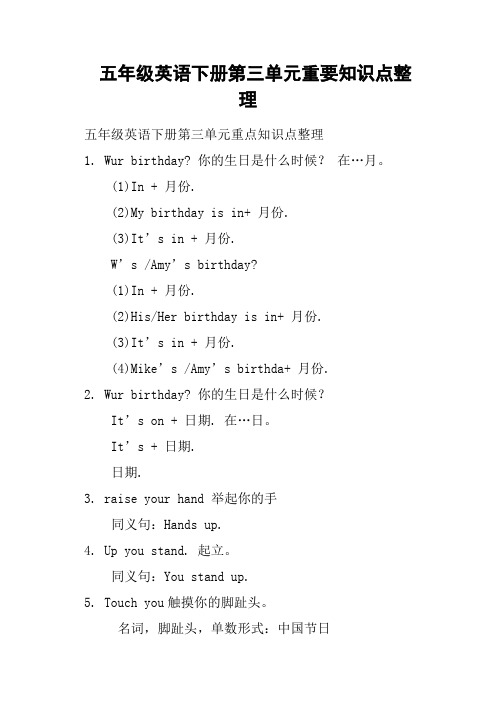
五年级英语下册第三单元重要知识点整理五年级英语下册第三单元重点知识点整理1. Wur birthday? 你的生日是什么时候?在…月。
(1)In + 月份.(2)My birthday is in+ 月份.(3)It’s in + 月份.W’s /Amy’s birthday?(1)In + 月份.(2)His/Her birthday is in+ 月份.(3)It’s in + 月份.(4)Mike’s /Amy’s birthda+ 月份.2. Wur birthday? 你的生日是什么时候?It’s on + 日期. 在…日。
It’s + 日期.日期.3. raise your hand 举起你的手同义句:Hands up.4. Up you stand. 起立。
同义句:You stand up.5. Touch you触摸你的脚趾头。
名词,脚趾头,单数形式:中国节日农历节日:农历正月初一春节(g Festival)农历正月十五元宵节(Lantern Festival)农历五月初五端午节(the Dragon-Boat Festival)农历七月初七乞巧节(中国情人节)(Double-Seventh Day)农历八月十五中秋节(the Mid-Autumn Festival)农历九月初九重阳节(the Double Ninth Festival) 3月8日Women’s Day 妇女节(Maghth)Ma月12日Tree-planting Day 植树节 ( Mawelfth) Mar.12月5日清明节(Tomb-sweeping Day)(April) A月1日Labor Day 劳动节(或May Day)(Ma) Ma月4日中国青年节(uth Day)( Maurth )Ma月12日国际护士节(Nurse Day) (May the twelfth )May 12月1日Chil dren’s Day 儿童节 (Ju) Ju月1日Army Day 建军节(Augu)Aug月10日Teachers’ Day 教师节(Septemb)Sept.100月1日National Day 国庆节(Octob)月1日New Year’s Day 元旦 (Janua)Ja外国常见节日2月14日Valentine’s Day 情人节(Februaurteenth)Feb月1日April Fool’s Day 愚人节(April)A月4日Independence Day 美国独立日(Julurth)Jul0月31日Halloween 万圣节(Octob-first)2月25日圣诞节(Christmas Day) Dec.2Thanksgiving Day 感恩节(11月最后一个星期四美国感恩节,10月的第二个星斯一加拿大感恩节)’s Day 母亲节(Mother’s Dad Sunday in May.)5月第二个星期日Father’s Day 父亲节(Father’s Dad Sunday in June.) 6月第三个星期日Easter Day复活节(春分月圆后的第一个星期日) (有可能是3月22-4月25日间的任一天)8. How many birthdays aanuary? 一月份有多少生日? There be 句型提问,要用There is/are … birthdays in …来回答。
五年级下册人教版(PEP)英语第三单元知识点

五年级下册英语第三单元
Unit3My school calendar
考点:
1.十二个月份及月份前介词的使用
2.询问某个节日/某个活动/假期(节日前不加the)在什么时候句型
一.月份及介词的使用
一月January
二月February
三月March
四月April
五月May
六月June
七月July
八月August
九月September
十月October
十一月November
十二月December
在一月in January
在六月in June
在十月in October
在十二月in December
在什么时候句型
句型结构:
问:When is+节日/the活动/the假期?答:It's in+月份.
1.植树节是什么时候?在三月。
When is Tree Planting Day?
It’s in March.
2.今年的学校旅行是什么时候?在五月。
When is the school trip this year?
It’s in May.
3.英语派对是什么时候?在四月。
When is the English party?
It’s in April.
4.圣诞节是什么时候?在十二月。
When is Christmas?
It’s in December.
5.国庆节在什么时候?在十月。
When is National Day?
It’s in October.。
苏教译林版英语 五年级下册 Unit 3 Asking the way 知识点总结
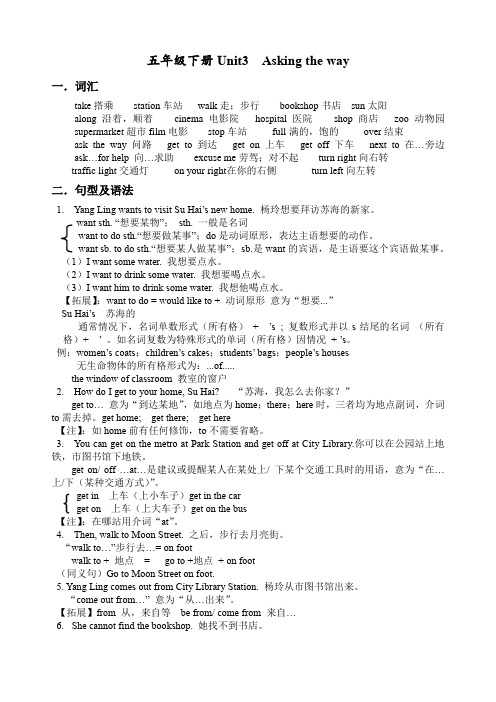
五年级下册Unit3 Asking the way一.词汇take搭乘station车站walk走;步行bookshop书店sun太阳along沿着,顺着cinema 电影院hospital医院shop商店zoo动物园supermarket超市film电影stop车站full满的,饱的over结束ask the way问路get to 到达get on上车get off下车next to在…旁边ask…for help 向…求助excuse me劳驾;对不起turn right向右转traffic light交通灯on your right在你的右侧turn left向左转二.句型及语法1. Yang Ling wants to visit Su Hai’s new home. 杨玲想要拜访苏海的新家。
want sth. “想要某物”;sth. 一般是名词want to do sth.“想要做某事”;do是动词原形,表达主语想要的动作。
want sb. to do sth.“想要某人做某事”;sb.是want的宾语,是主语要这个宾语做某事。
(1)I want some water. 我想要点水。
(2)I want to drink some water. 我想要喝点水。
(3)I want him to drink some water. 我想他喝点水。
【拓展】:want to do = would like to + 动词原形意为“想要...”Su Hai’s 苏海的通常情况下,名词单数形式(所有格)+ ’s ; 复数形式并以s结尾的名词(所有格)+ ’ 。
如名词复数为特殊形式的单词(所有格)因情况+ ’s。
例:women’s coats;children’s cakes;students’ bags;people’s houses无生命物体的所有格形式为:...of.....the window of classroom 教室的窗户2. How do I get to your home, Su Hai? “苏海,我怎么去你家?”get to… 意为“到达某地”,如地点为home;there;here时,三者均为地点副词,介词to需去掉。
五年级英语下册第三单元知识点
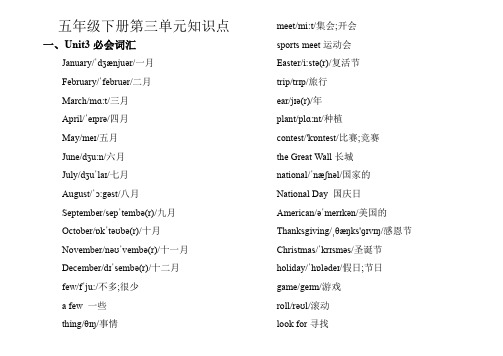
五年级下册第三单元知识点一、Unit3必会词汇January/ˈdʒænjuər/一月February/ˈfebruər/二月March/mɑ:t/三月April/ˈeɪprə/四月May/meɪ/五月June/dʒu:n/六月July/dʒuˈlaɪ/七月August/ˈɔ:gəst/八月September/sepˈtembə(r)/九月October/ɒkˈtəʊbə(r)/十月November/nəʊˈvembə(r)/十一月December/dɪˈsembə(r)/十二月few/fˈju:/不多;很少a few 一些thing/θɪŋ/事情meet/mi:t/集会;开会sports meet运动会Easter/i:stə(r)/复活节trip/trɪp/旅行ear/jɪə(r)/年plant/plɑ:nt/种植contest/'kɒntest/比赛;竞赛the Great Wall长城national/ˈnæʃnəl/国家的National Day 国庆日American/əˈmerɪkən/美国的Thanksgiving/ˌθæŋks'ɡɪvɪŋ/感恩节Christmas/ˈkrɪsməs/圣诞节holiday/ˈhɒlədeɪ/假日;节日game/geɪm/游戏roll/rəʊl/滚动look for寻找chocolate/ˈtʃɒklət/巧克力bunny/ˈbʌni/(用作儿语)兔子RSVP(尤用于请柬)请赐复by/baɪ/在……之前+信件、邮件地址二、Unit3必考短语常用节假日名称:New Year’s Day元旦(公历1.1)The Spring Festival春节(农历腊月三十)Lantern Festival(农历正月十五)Tree Planting Day 植树节(3.12)Easter 复活节(3、4月之间)April Fool’s Day愚人节(4.1)May Day 劳动节(5.1)Mother’s Day母亲节(每年五月的第二个星期日) Children’s Day 儿童节(6.1)Father’s Day父亲节(每年六月的第三个星期日) Party’s Day 建党节(7.1)Army Day 建军节(8.1)Teachers’ Day教师节(9.10)China’s National Day国庆节(10.1)Mid-Autumn Day 中秋节(农历八月十五)Thanks giving Day 感恩节(11月第4个周四)Christmas圣诞节(12.25)summer vacation暑假winter vacation寒假活动名称:sports meet 运动会Easter party 复活节聚会school trip 学校旅行Chinese test 语文测试singing contest歌唱比赛birthday party生日聚会三、Unit3必考句型1、问答某个活动或节日在几月份的句型及回答。
五年级下册牛津英语M3知识点
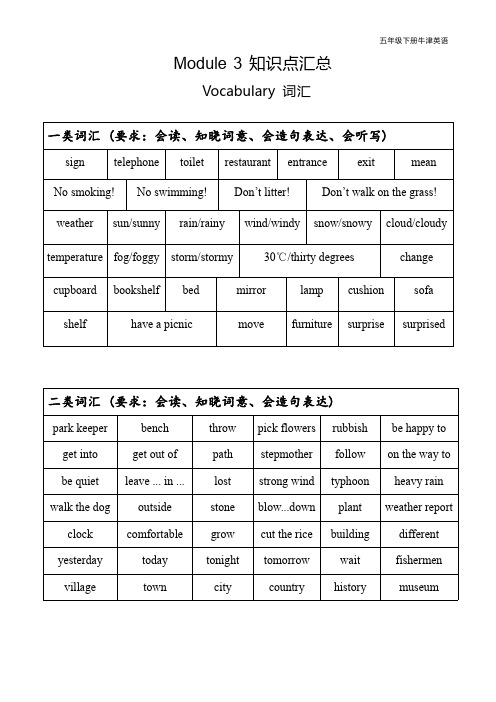
Module3知识点汇总Vocabulary词汇一类词汇(要求:会读、知晓词意、会造句表达、会听写) sign telephone toilet restaurant entrance exit mean No smoking!No swimming!Don’t litter!Don’t walk on the grass! weather sun/sunny rain/rainy wind/windy snow/snowy cloud/cloudy temperature fog/foggy storm/stormy30℃/thirty degrees change cupboard bookshelf bed mirror lamp cushion sofa shelf have a picnic move furniture surprise surprised二类词汇(要求:会读、知晓词意、会造句表达)park keeper bench throw pick flowers rubbish be happy to get into get out of path stepmother follow on the way to be quiet leave...in...lost strong wind typhoon heavy rain walk the dog outside stone blow...down plant weather report clock comfortable grow cut the rice building different yesterday today tonight tomorrow wait fishermen village town city country history museum语音词汇(要求:会拼读、知晓词意、认读音标)音标组合例词/l/l like late black blouse blind glass glue /r/r radio red grow grass rough bread right wr write wrong/θ/th third think month mouth throw thin tooth /ð/th they these mother father those smooth this一、重点句子(要求:会读、知晓句意、会替换造句、尝试背诵)1.They are sitting on the bench.A girl is walking her dog.2.What does the sign mean?It means we can’t throw the rubbish here.3.What does the sign say?It says‘Don’t litter!’4.Look at the sign.You can’t ride your bicycle here.5.Where can we get into the park?Here’s a sign.It says‘Entrance’.6.Hey,you!Look at the sign!You must be quiet here.7.On the way to the forest,Hansel drops the stones.8.What’s the weather like today?It’s rainy/windy/cloudy/stormy/foggy.9.I like the rain.It helps my plants grow.I don’t like the wind.It blows my plants down.10.It’s sunny weather/It’s a sunny day.I like the sun.It makes my plants strong.11.Here’s the weather report.A typhoon is coming from the East China Sea.12.We had a hot and sunny day yesterday.The temperature was thirty degrees.13.We will have heavy rain and a strong wind.The temperature will be twenty-eight degrees.14.George stayed in his house.He enjoyed himself very much.15.Dad is coming home next week.Let’s give him a surprise.16.Let’s move the furniture.Sounds fun.17.Let’s put the sofa under the window first.18.The living room looks different.19.Are there any changes in our living room?20.The mirror was behind the chair.Now it’s next to the shelf.21.Wait!Where was the picture?I can’t remember.22.There was a cat on the big blue sofa.There is a dog on the big blue sofa now.23.Many of them were fishermen and farmers.24.Some of them are from other countries.二、语法知识点(要求:理解并运用)1.使用特殊疑问句询问标志的含义。
义务教育五年级下册英语模块三语法

义务教育五年级下册英语模块三语法模块三的语法主要包括以下几个方面:1.一般现在时:用于表达经常性的动作或事实。
句子结构为主语+动词原形。
例如:He often plays football on weekends.2.一般过去时:用于表达过去发生的动作或状态。
一般过去时的句子结构为主语+动词过去式。
例如:I visited my grandparents last summer.3.现在进行时:用于表达现在正在进行的动作。
句子结构为主语+be动词(am/is/are)+动词-ing形式。
例如:She is reading a book now.4.情态动词can和could:表示能力或许可。
can用于现在时,could用于过去时。
例如:She can swim well.He could ride a bike when he was five.5.物主代词:用于表示所属关系。
例如:This is my book. That is his pencil.6.比较级和最高级:用于对两个或两个以上事物进行比较。
句子结构为主语+be动词+形容词的比较级/最高级。
例如:The elephant is bigger than the cat.The panda is the cutest animal in the zoo.7.祈使句:用于表示请求、命令、建议等。
句子结构为动词原形+其他。
例如:Open the window,please.Don't eat too much ice cream.这些是模块三的一些常见语法知识点,希望对你有帮助。
五年级英语下册第三单元重要词组汇总
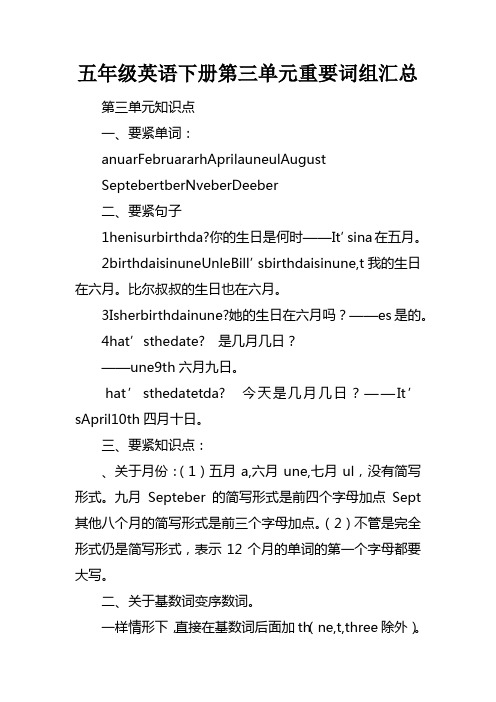
五年级英语下册第三单元重要词组汇总第三单元知识点一、要紧单词:anuarFebruararhAprilauneulAugustSeptebertberNveberDeeber二、要紧句子1henisurbirthda?你的生日是何时——It’sina在五月。
2birthdaisinuneUnleBill’sbirthdaisinune,t我的生日在六月。
比尔叔叔的生日也在六月。
3Isherbirthdainune?她的生日在六月吗?——es是的。
4hat’sthedate? 是几月几日?——une9th六月九日。
hat’sthedatetda?今天是几月几日?——It’sApril10th四月十日。
三、要紧知识点:、关于月份:(1)五月a,六月une,七月ul,没有简写形式。
九月Septeber的简写形式是前四个字母加点Sept 其他八个月的简写形式是前三个字母加点。
(2)不管是完全形式仍是简写形式,表示12个月的单词的第一个字母都要大写。
二、关于基数词变序数词。
一样情形下,直接在基数词后面加th(ne,t,three除外)。
ne—first,t—send,three—third以ve结尾的基数词,变ve为f,再加th如:five—fifth,telve—telfth以t结尾的基数词,直接加h。
如eight—eighth以不发音的字母e结尾的,丢掉不发音的字母e,再加th如nine—ninth以结尾的整十数,在变成序数词时,将变成ie再加th 如tent—tentieth20以上的两位数,变成序数词时,十位数不变,只将个位上的数变成序数词。
如:tent-ne----tent-first, tent-t—tent-send,thirt-fur—thirt-furth序数词的简写形式为表示该词的阿拉伯数字加上该单词的最后两个字母,最后两个字母要变成上标格式。
如:first —1st,send—2nd,third—3rd,furth—4thtentieth—20th 3在回答henisurbirthda?那个问题时,若是只说明生日在几月份,在月份前用in。
小学英语五年级下册第三单元知识总结

Unit 3 Writing Home词汇、短语一、名词:1.mum 妈妈2. dad 爸爸3.email 电子邮件4. idea 想法5. computer 电脑6. left左边7. right 右边二、动词:1.write 写2. turn 转弯3. use 使用三、形容词:1.dear 亲爱的2. fine 健康的3. left 左边的4. right 右边的5.wrong 错误的6.kind 友好的四、副词:much 非常六、代词:us 我们(we 的宾格形式)短语:1.in the shop 在商店2.on the left 在左边3. on the right 在右边重点句子一、陈述句:1. A postcard has a picture on it.明信片上有一张图片。
2. We write a letter on paper.我们在纸上写信。
3. We write an email on a computer.我们在电脑上写邮件。
4. This postcard has a pitcture of the Palace Museum.这张明信片上有一张故宫的照片。
5. I want to send an email to my father.我想给我爸爸发送一封邮件。
二、一般疑问句:1. --May I see that postcard?我能看一下那张明信片吗?--Sure.当然可以。
2. --Is it snowy?是雪天吗?三、特殊疑问句:1. --How much is this postcard?这张明信片多少钱?--It's two yuan.两块钱。
2.--Where do you write on a postcard?你在明信片的什么地方写字?--On the left.在左边。
3. --How much are they?这些多少钱?--They are twenty yuan. 这些20元。
沪教版五年级下册英语Unit3 In the future
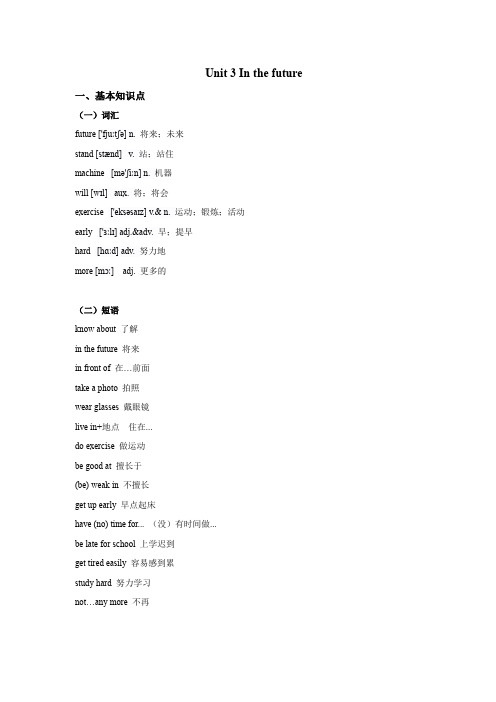
Unit 3 In the future 一、基本知识点(一)词汇future ['fjuːtʃə]n. 将来;未来stand [stænd]v. 站;站住machine [mə'ʃiːn]n. 机器will [wɪl]aux. 将;将会exercise ['eksəsaɪz]v.& n. 运动;锻炼;活动early ['ɜːlɪ] adj.&adv. 早;提早hard [hɑːd] adv. 努力地more[mɔː] adj. 更多的(二)短语know about 了解in the future 将来in front of 在…前面take a photo 拍照wear glasses 戴眼镜live in+地点住在...do exercise 做运动be good at 擅长于(be) weak in 不擅长get up early 早点起床have (no) time for... (没)有时间做...be late for school 上学迟到get tired easily 容易感到累study hard 努力学习not…any more 不再(三)句型1.I’ll be a teacher2.I won’t wear glasses.3.—Will she have beautiful eyes?—Yes, she will./ No, she won’t.4.What will Peter do?/Where will he live?(四)重难点、易错点1.一般将来时:表示将要发生的动作或存在的状态,与表示将来的时间状语连用。
本单元主要学习will+动词原形结构。
2.一般将来时的句型转换及回答3.一般现在时与一般将来时区别:注意动词形式4.写作:描述现在与将来的变化二、典型例题1. Danny will________ a driver in the future.A.isB. amC. be2.—Will your sister wear glasses?—________.A.Yes, she will be.B. No, she won’t.C. Yes, she won’t.3.In ten years, I ________ be a bus driver. I like driving buses.A.willB. amC. want4. I ________(will not) swim in the sea in winter.5. — ________will you be ________ in the________?— I will be tall and cool.三、变式习题基础题(一)词汇将来in front of拍照wear glasses站;站住machine不再做运动be good at不擅长(二)补全单词并翻译汉语tom__ __ row ( )mac__i __ e( )exe__ __i __e( )e__ __ly( )ha__ __( )s__ a__d ( )提高题(一)单项选择( ) 1. I like English very much. I’m ________ it.A. good atB. weak inC. weak at ( ) 2. Don’t watch _______TV. It’s bad for your eyes.A. too manyB. too muchC. a little ( ) 3. Hurry up! We will have no time ________ breakfast.A.forB. withC.eat ( ) 4. Ben doesn’t like sports and he gets tired ________.A. easyB. earlyC.easily ( ) 5. —Where is Mr Fang?—She is ________the blackboard.A. in front ofB. behindC. at the top of(二)问答句配对()1. What will Alice be in the future? A. I will be a good teacher.()2.What will you be like in fifteen years? B. I will have beautiful eyes.()3. Will I wear glasses in fifteen years? C. No, you won’t.()4. Where will I live in the future? D.She will be a singer.()5. Will you be a teacher or a singer? E. You will live in London.强化题(一)按要求改写句子1.I will live in Beijing in the future. (改成否定句)______________________________________________________________2.Peter is good at Maths and English.(对划线部分提问)_______________________________________________________________3.I don’t have time for breakfast . (改为同义句)_______________________________________________________________4.My father will live in Shanghai.. (对划线部分提问)_______________________________________________________________5.in, stands ,of, a , magic, front, machine, She.(连词成句)_______________________________________________________________(二)阅读短文,判断句子正误,填入T(正确)或F(错误)Dan is a little boy. One day, he is sitting in a tree in his garden. Then a man walks by. He stops and says, “Don’t sit in the tree. You will fall down .” Dan doesn’t listen to him. He thinks, “I’m so clever. I won’t listen to him and I will never fall down. ” He sits on the branch(树枝). He tries to cut the branch. After a few minutes, he falls down. “Wow! That man knows the future! ” Dan cries.()1. Dan is at school.()2. Dan is sitting under the tree.()3. Dan doesn’t listen to the man.()4. The man knows about Dan’s future.()5. Dan is a clever boy.(三)写作以“My future”为题,写一篇小短文,不少于30个词。
人教版英语五年级下三单元知识点-Unit 3 Making Contact
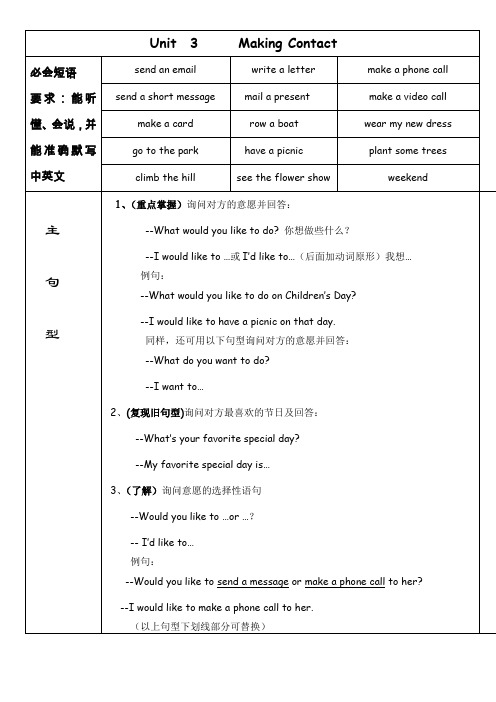
go to the park
have a picnic
plant some trees
climb the hill
see the flower show
weekend
主
句
型
1、(重点掌握)询问对方的意愿并回答:
--What would you like to do?你想做些什么?
Unit3Making Contact
必会短语
要求:能mail
write a letter
make a phone call
send a short message
mail a present
make a video call
make a card
row a boat
--Iwould like to…或I’d like to…(后面加动词原形)我想…
例句:
--What would you like to do on Children’s Day?
--Iwould like to have a picnic on that day.
同样,还可用以下句型询问对方的意愿并回答:
--What do you want to do?
--Iwant to…
2、(复现旧句型)询问对方最喜欢的节日及回答:
--What’s your favorite special day?
--My favorite special day is…
3、(了解)询问意愿的选择性语句
--Would you like to…or…?
-- I’d like to…
例句:
--Would you like tosend a messageormake a phone callto her?
五年级下册英语第三模块学霸笔记

五年级下册英语第三模块学霸笔记
1.询问某人三餐吃了什么的句型询问某人三餐吃了什么的句型——What did...have for...? 1.课文应用:And what did she have for lunch?她午餐吃了什么?
She had sandwiches.她吃了三明治。
2.句型结构:问句:What did+某人+have for+三餐名称?
答语:某人+had+食物名称. 3.重点解析:此问句是一个由what引导的特殊疑问句。
what意为“什么”。
因为句子的时态是一般过去时,所以助动词用did。
此处三餐前用介词for。
答语中的had是have和has的过去式,意为“吃”。
2.描述某人吃了什么的句型描述某人吃了什么的句型——...ate... 课文应用:Today Sam ate four hamburgers at school!今天萨姆在学校吃了四个汉堡包!
句型结构:某人+ate(+数量)+食物名称(+其他).
重点解析:此句是一般过去时的陈述句,描述过去发生的事情。
ate是eat 的过去式,意为“吃”。
3.描述某人非常喜欢某物的句型描述某人非常喜欢某物的句型——...like(s)very much.
课文应用:He likes hamburgers very much.他非常喜欢汉堡包。
句型结构:主语-l-like(s)+名词+very much.
重点解析:此句型用来描述某人非常喜欢某物。
若主语为第三人称单数,动词like要用第三人称单数形式likes。
- 1、下载文档前请自行甄别文档内容的完整性,平台不提供额外的编辑、内容补充、找答案等附加服务。
- 2、"仅部分预览"的文档,不可在线预览部分如存在完整性等问题,可反馈申请退款(可完整预览的文档不适用该条件!)。
- 3、如文档侵犯您的权益,请联系客服反馈,我们会尽快为您处理(人工客服工作时间:9:00-18:30)。
五年级英语三模块重点知识
一词汇
1 have (过去式) had 2egg复数) eggs 3 sausage(复数) sausages 4 I’ve = I have 5 sandwich (复数) sandwiches 6 chip(复数) chips
7 hamburger(复数) hamburgers 8 like(单三)likes 9 give (过去式)gave
10eat(过去式)ate
二短语
1 have got(有)
2 an email from(一封来自…的电子邮件)
3 English food (英国的食物)
4 Chinese food (中国的食物
5 a traditional English dinner(一顿传统的英国晚餐)
6 six hamburgers(六个汉堡)
7 at school (在学校)
8 give ..to.. (给某人某物)
9 cook …for..(为..而做)
三重点句子
1 I’ve got an email from Lingling.(我有一封来自玲玲的电子邮件)
2 It’s about English food.(他是关于英国的食物)
3 What did she have for breakfast?(她早饭吃了什么)
(她吃了鸡蛋和香肠)
4 She had eggs and sausages.
5 What did she have for lunch?(她午饭吃了什么)
6 She had sandwiches.(她吃了三明治)
7 What did she have for dinner?(晚饭吃了什么)
8 She had fish and chips.(她吃了鱼和薯条)
9 Today Sam ate six hamburgers at school.(今天山姆吃了六个汉堡)
10 We gave our hamburgers to Sam.(我们把汉堡给了山姆)
11 Tonight Mum is going to cook Chinese food for Lingling.(今晚妈妈将为玲玲做中国的食物)。
